‘Men on a mission’ It takes a huge team effort — beyond those on the ice — to keep the Winnipeg Jets firing on all cylinders as they endure the most hectic travel period of their season
Read this article for free:
or
Already have an account? Log in here »
To continue reading, please subscribe:
Monthly Digital Subscription
$0 for the first 4 weeks*
- Enjoy unlimited reading on winnipegfreepress.com
- Read the E-Edition, our digital replica newspaper
- Access News Break, our award-winning app
- Play interactive puzzles
*No charge for 4 weeks then price increases to the regular rate of $19.00 plus GST every four weeks. Offer available to new and qualified returning subscribers only. Cancel any time.
Monthly Digital Subscription
$4.75/week*
- Enjoy unlimited reading on winnipegfreepress.com
- Read the E-Edition, our digital replica newspaper
- Access News Break, our award-winning app
- Play interactive puzzles
*Billed as $19 plus GST every four weeks. Cancel any time.
To continue reading, please subscribe:
Add Free Press access to your Brandon Sun subscription for only an additional
$1 for the first 4 weeks*
*Your next subscription payment will increase by $1.00 and you will be charged $16.99 plus GST for four weeks. After four weeks, your payment will increase to $23.99 plus GST every four weeks.
Read unlimited articles for free today:
or
Already have an account? Log in here »
Hey there, time traveller!
This article was published 06/12/2024 (348 days ago), so information in it may no longer be current.
It is a gruelling stretch of schedule the likes of which the Winnipeg Jets have never seen.
Starting on Nov. 9 and mercifully ending Saturday, the team will have played 14 consecutive games — 17 per cent of their entire 2024-25 campaign — for which they had to board a plane to head to a different city.
Their travels took them from Winnipeg to New York to Tampa Bay to Sunrise, Fla., to Winnipeg to Pittsburgh to Nashville to Minneapolis/St.Paul to Los Angeles to Las Vegas to Dallas to Winnipeg to Buffalo to Chicago and then back to Winnipeg.
Add it all up and that’s just north of 25,000 kilometres covered by air over the last 29 days. If it felt like one continuous road trip, that’s because it essentially was, with just a pair of one-game pit stops at Canada Life Centre among a steady diet of dates in enemy territory.
There’s no rest for the wicked as the Jets open a four-game home stand on Sunday, but at least they’ll finally get a chance to settle in and unpack their worn-out suitcases for the first time in a month.
MIKAELA MACKENZIE / FREE PRESS Following six road games, the club had a brief stop at home before heading out again. Assistant equipment manager Mark Grehan dries and hangs skates in the locker room at the Canada Life Centre during the layover.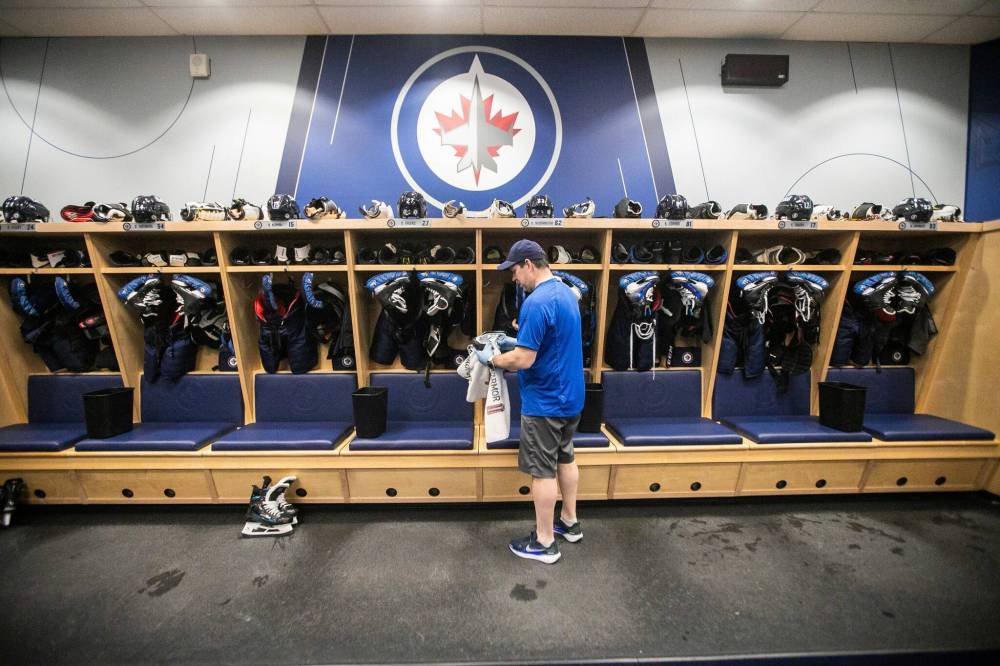
The Free Press is one of the few newspapers in North America still covering its local NHL team on a full-time basis on the road.
Hockey writer Mike McIntyre got back earlier this week from the Jets’ longest single journey in several years — 10 days, six cities, three time zones — and spent part of it digging into what it takes to keep a professional hockey team healthy, happy and performing at a high level while away from home for an extended stretch.
As he discovered, there is an entire team behind the team, one that doesn’t typically make headlines or show up in the box scores but is vitally important to the daily operations.
PITTSBURGH — Mason Appleton is standing in the Jets’ dressing room, sweat still dripping down his face after a vigorous morning skate.
He takes a deep breath as he’s asked to unpack what is on the horizon.
THE TEAM BEHIND THE TEAM
As befitting the NHL team playing in the smallest market, the Winnipeg Jets’ overall staffing complement is one of the smallest, if not the smallest, in the league.
On the recent road trip, the Jets’ entire entourage totalled four dozen — 24 players and 23 to 24 coaches, management and support staff.
As befitting the NHL team playing in the smallest market, the Winnipeg Jets’ overall staffing complement is one of the smallest, if not the smallest, in the league.
On the recent road trip, the Jets’ entire entourage totalled four dozen — 24 players and 23 to 24 coaches, management and support staff.
In addition to head coach Scott Arniel and his four assistants — Marty Johnston, Davis Payne, Dean Chynoweth and Wade Flaherty — there’s also video coach Matt Prefontaine and hockey video co-ordinator James Cochrane who are at all games. General manager Kevin Cheveldayoff is almost always at every road game, and assistant GM Larry Simmons often is, too. Assistant GM Craig Heisinger occasionally hits the road with the team as well.
Additionally, the road crew includes the team broadcasters — two radio guys, two TV guys, plus their in-house social media team, which typically is two to three people.
The Jets do have a team of doctors, dentists, optometrists, psychiatrists, psychologists and even a chaplain — but all those people typically are not on the road. Same with the analytics crew (of three) and player development team (Jimmy Roy and Mike Keane). The Jets will occasionally take their medical director, Dr. Peter MacDonald, with them — such as for the playoffs last year, when he was thrust into duty during two bloody incidents where Brenden Dillon suffered a gruesome skate cut in Denver in Game 3, then Vlad Namesntikov suffered a fractured jaw after taking a puck to the face in Game 4.
— Mike McIntyre
“It’s tough on the body, but we’ll be all right and find the perfect balance of recovery and rest,” the veteran winger says on Nov. 22, a few hours before his team will hit the ice and down the hometown Penguins by a 4-1 score.
Appleton’s confidence about his club isn’t just due to the fact they’ve hit the road sitting No. 1 in the NHL standings thanks to a historic start that saw the team become the first ever to win 15 of the first 16 games.
It’s also because there are more than a dozen dedicated support staff members ensuring every little detail is covered.
“What the trainers do and the equipment guys do kind of goes unnoticed, because they do such a good job of it. It’s the exact same way every single time,” Appleton said.
“It’s obviously a job that they work their tails off (at) and a lot of it goes unnoticed. We try to thank them every day. It’s a lot on them on these road trips. They’re a huge part of it.”
Most of us are creatures of habit. That’s especially true for professional athletes.
Jets alternate captain Mark Scheifele is as particular as they come — from his smoothies and protein shakes to his game-day routines whether at home or away.
The first-ever pick of the 2.0 Jets, who will likely play his entire career in Winnipeg after signing a seven-year extension that kicked in this season, is quick to dish out the praise.
“The thing is, I don’t think we even see half of it. They go and unload our bags, they sharpen skates, they’re here an hour and a half before we even get here, and then they make sure everything’s perfect, that you have everything you need,” Scheifele said.
“Whatever you need they have it ready. And then obviously you’re dealing with bumps and bruises and stuff like that.
“I think they have such a great camaraderie together that every time you come to the rink, they have smiles on their faces, they make you laugh and I think whether it’s good times or bad times, it’s very invaluable to have guys that are in your corner and can pick you up when you’re down and keep you humble when you’re a little too high.
“They do an amazing job and we can’t thank them enough.”
MIKAELA MACKENZIE / FREE PRESS Head equipment manager Jason McMaster says his crew ensures everything is in the same spot regardless whether the team is at home or on the road.
NASHVILLE — You would excuse Jason McMaster if he was fighting to keep his eyes open. But the Jets’ head equipment manager never shows signs of slowing down, even when a challenging back-to-back wreaks havoc on his sleep schedule.
“People ask how do we do it with the crazy hours and always being at the rink. But it’s in your blood. It’s either in you or it isn’t,” explained McMaster, who took on the head role in 2015-16. “If it isn’t, you’re not going to enjoy this line of work one bit.”
Consider his last few days: the Jets flew into Pittsburgh on Thursday afternoon, but McMaster and his staff didn’t go straight to the hotel with the rest of the entourage.
“Our path, as soon as we land, is rink, then hotel. Get everything set up. If it’s in the afternoon like that, we’re 100 per cent set up that evening,” McMaster said.
MIKE MCINTYRE / FREE PRESS Jerseys, suitcases, laundry bags and equipment cases make up some of the 2,100 kilograms of gear that follows the team around.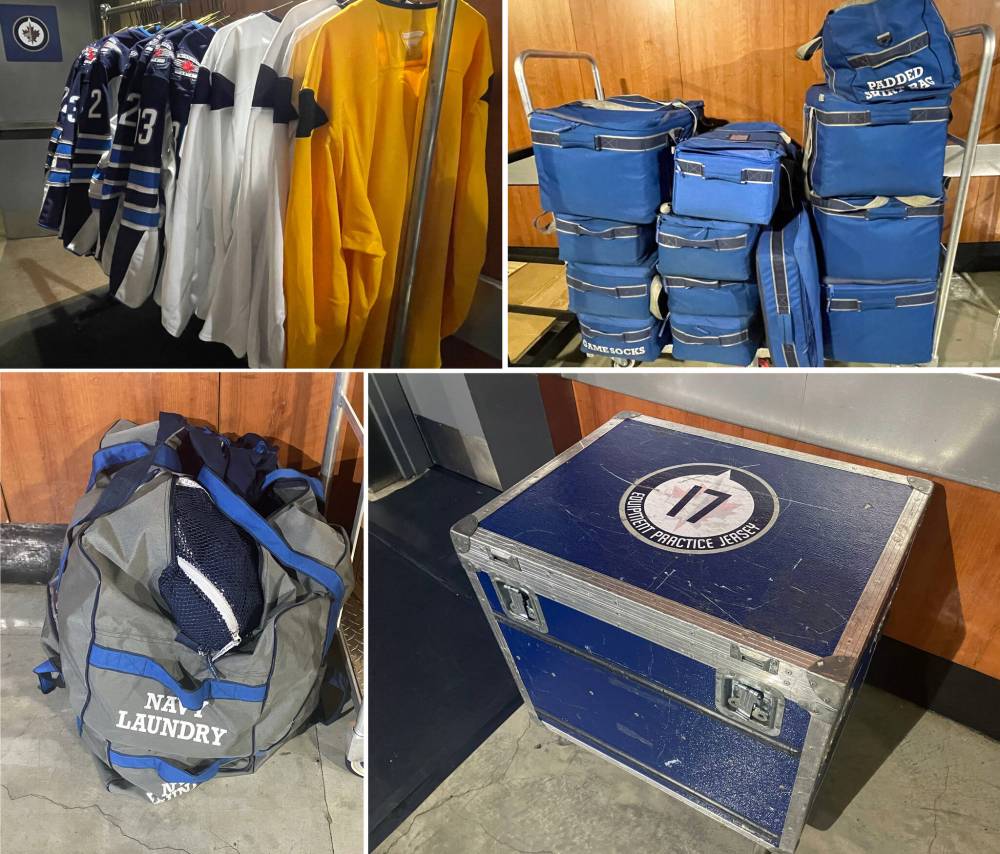
Their job involves unloading the truck, bringing in approximately 2,100 kilograms of equipment, getting the dressing room and coach’s room set up and making sure everyone’s gear is accounted for.
After a solid night’s sleep, McMaster got to the rink around 8 a.m. Friday to make sure everything was ready for the 11 a.m. morning skate. There’s a lot of work to do, especially with players typically donning new gloves and skates every eight to 10 games.
“I talk to each player on these long ones and just work with them to make sure we’re both organized to have what they need,” he said.
As soon as the game in Pittsburgh ended, McMaster and his staff, which includes assistant equipment managers Rob Cook and Mark Grehan, were racing through the dressing room collecting bags to load up into a waiting truck that would take them from the arena to Pittsburgh International Airport.
Ideally, the plane leaves exactly four hours after the start of the game.
MIKE MCINTYRE / FREE PRESS Packing and unpacking is all in a day’s work.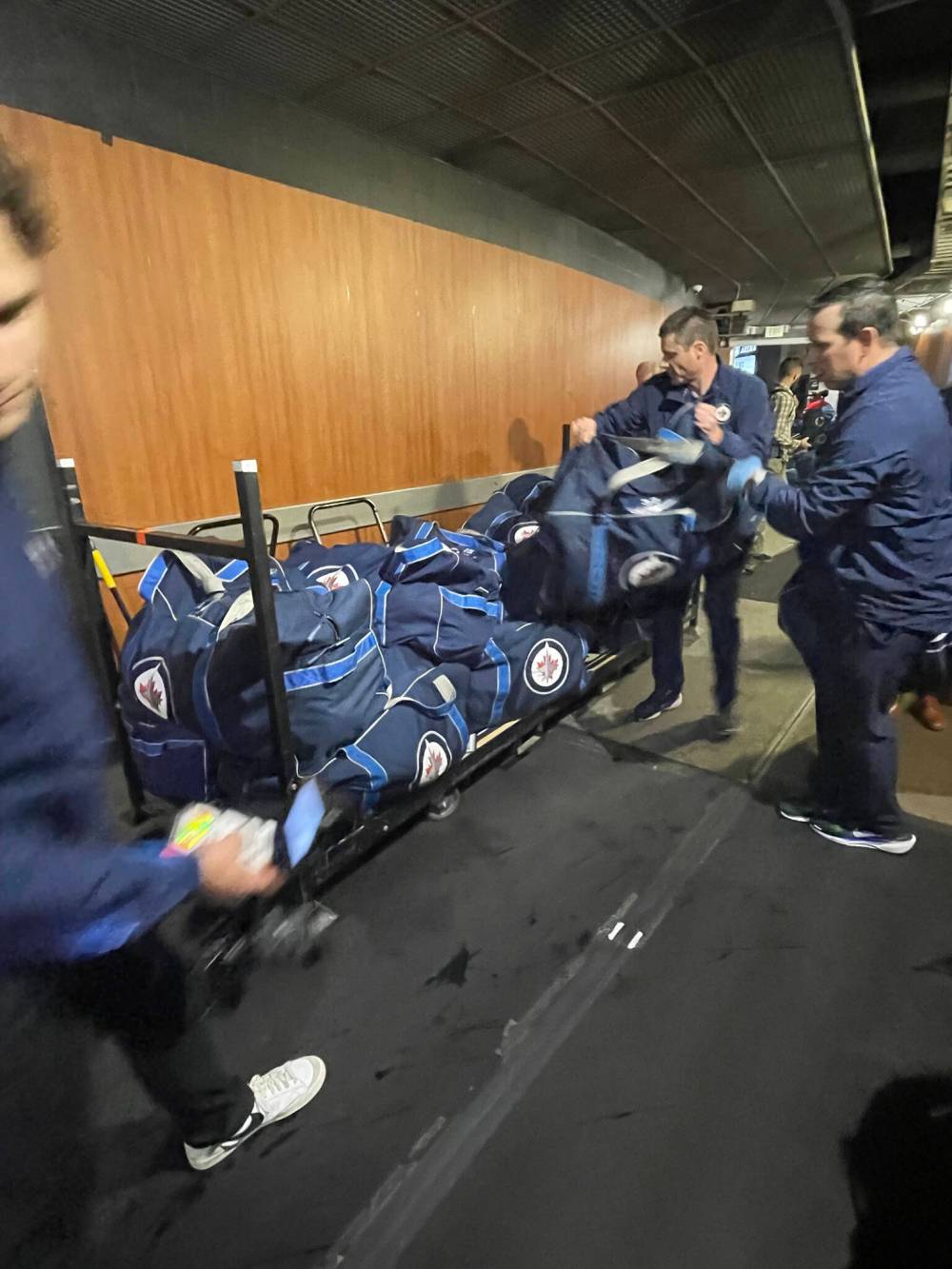
“The biggest stress is doing everything in our power to have the plane loaded before the bus gets there. You see how fast we get out of here post-game. We’re men on a mission post-game,” he said.
“You can see why. It’s to get that truck to the airport as quick as possible, because we want to get the bird in the air. At the end of the day you want everybody to get as much rest as possible.”
McMaster is quick to tip his cap to the players who routinely help carry bags to the truck to expedite the process. Players say it’s the least they can do.
“It’s a whole team effort. Everyone is doing their job and we appreciate them so much,” said forward Alex Iafallo.
“Just putting in all the hours and all the work just keeps us alive and keeps us pushing to the next level. We owe everything to them. I know it’s a grind for them.”
The Jets landed in Nashville around midnight, thanks partly to gaining an hour during the nearly two-hour flight as they went from the eastern time zone back to the central, and then McMaster’s crew was off to Bridgestone Arena into the wee hours to get things set up once again for Saturday’s game against the Predators.
“So everybody’s comfortable, we try to have everything in the exact same spot everywhere. Home and away,” said McMaster.
MIKE MCINTYRE / FREE PRESS After a road game, McMaster and his staff race to load everything into a truck that's waiting to take them to the airport. Ideally, the plane leaves exactly four hours after the start of the game.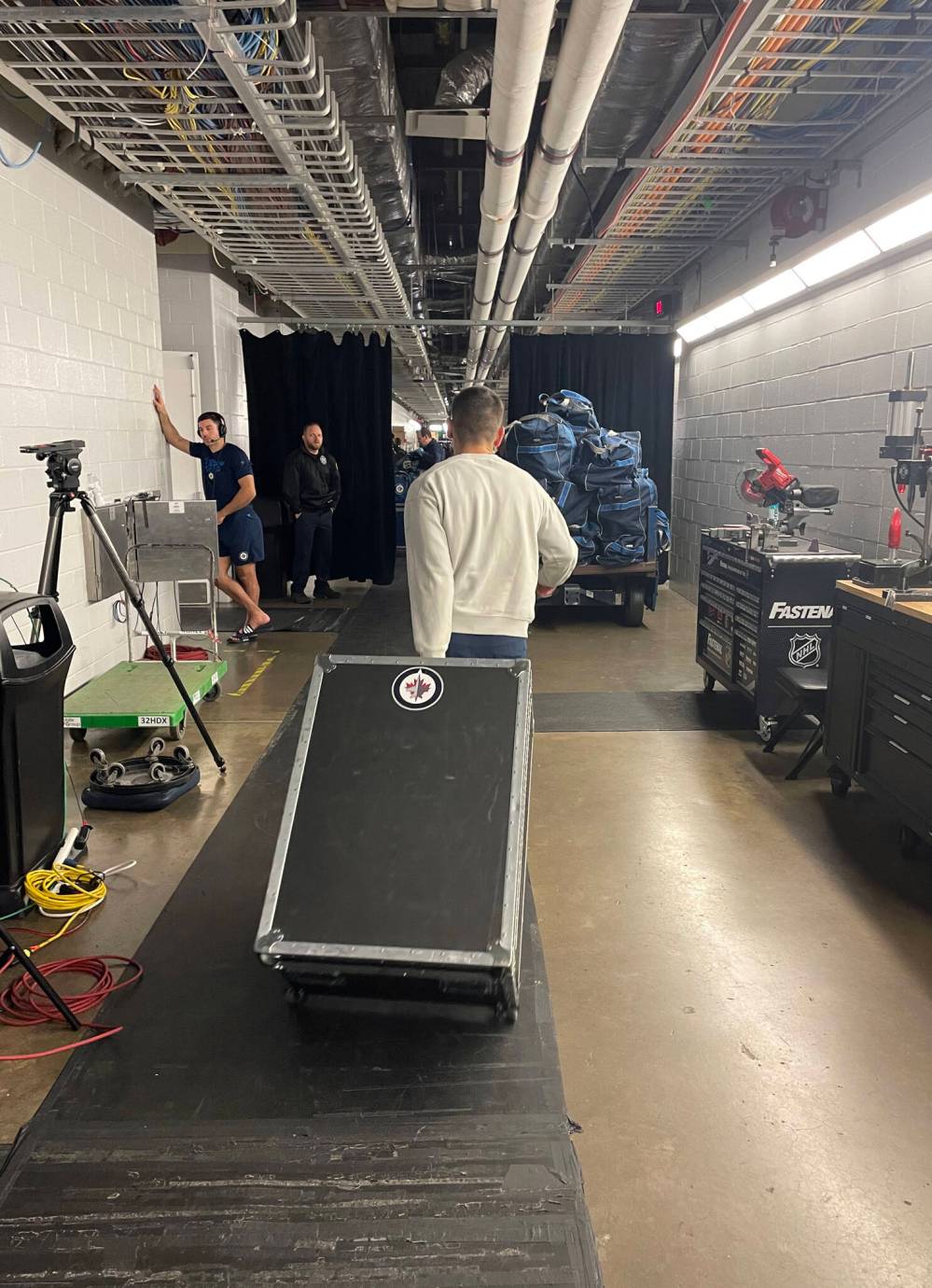
“Same with where the guys sit. I keep a chart of each room so I remember where each guy sits.”
This routine will play out for the entire trip, including Monday night/Tuesday morning when they’ll fly more than four hours from Minneapolis to Los Angeles and be at Crypto.com Arena until well past 3 a.m.
“(That flight) is a good chance to get some sleep, because once you wake up and you get to work, you’re wide awake and don’t fall asleep for an hour or two when you get to the hotel,” said McMaster.
“So it’s like the players who can’t sleep after the game, we’re kind of similar in that we’re wide awake from exerting ourselves pushing heavy trunks around.”
McMaster tries to sneak in a game-day afternoon nap where possible, but sometimes the rink and hotel are too far apart to go back between morning skate and puck drop.
That can be tough, especially when you need to be alert at all times during games while on the bench.
“It’s hectic. We’re (drying) gloves, changing steel, switching sticks. It’s just non-stop,” he said.
“We’ve got to be sharp while we’re doing the (pre-game) work, and then we’ve got to be sharp during the game for anything that’s needed.
“It’s equally as important to make sure we’re contributing to our department and making sure everything is being executed properly.”
MIKAELA MACKENZIE / FREE PRESS Assistant equipment manager Mark Grehan dries and hangs skates in the locker room.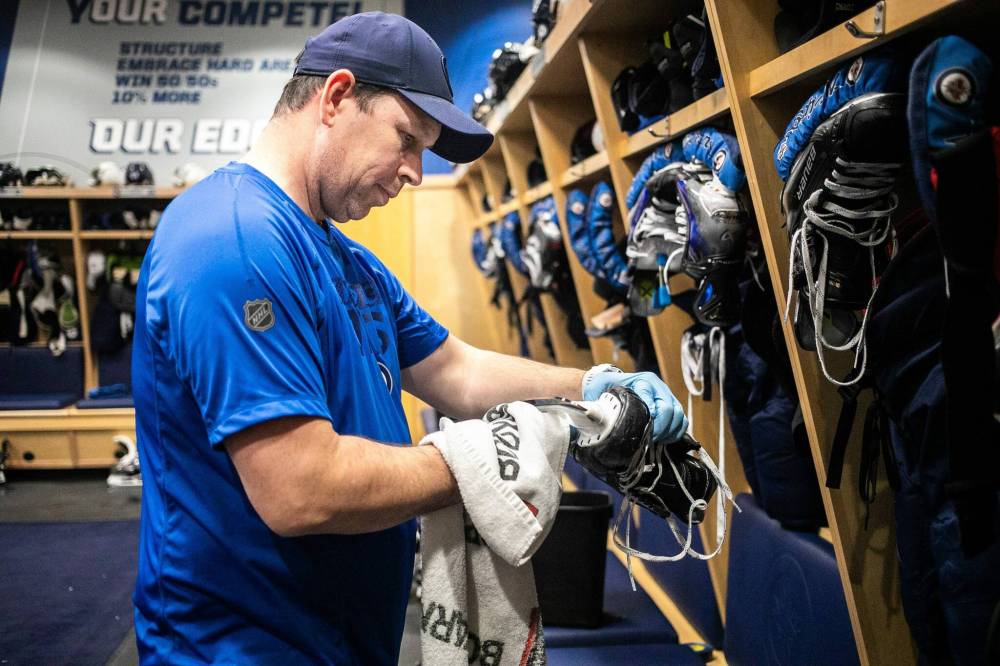
Things get really chaotic when a player goes down with an injury, as defenceman Dylan Samberg did in Nashville when he blocked a shot that broke his foot.
“It gets real crazy when there’s a blood incident. You’ve got to clean all the gear, too, disinfect it,” McMaster said.
“But nobody needs to be told what to do. We plan things meticulously and make sure it’s executed properly.
“We all have our jobs and we know the precise situation of who is doing what.”
ST. PAUL — Al Pritchard is the hockey-player whisperer.
Poor sleep? Sore muscles? The beloved athletic therapist known as “Pritchy” usually has the cure.
“The No. 1 thing is rest. And hydration. For guys after games, it’s hard to just settle down and relax and get the sleep they need,” said Pritchard, who makes a point of checking in with every player every day to see how they’re feeling.
“I think it’s communication, and we’ve expressed that all the time. We can’t read your mind, we don’t know what’s going on with your body,” he said.
Pritchard, who was recently celebrated for working his 1,000th game with the Jets, has his work cut out for him during a stretch of the season such as this.
MIKAELA MACKENZIE / FREE PRESS Jets athletic therapist Al Pritchard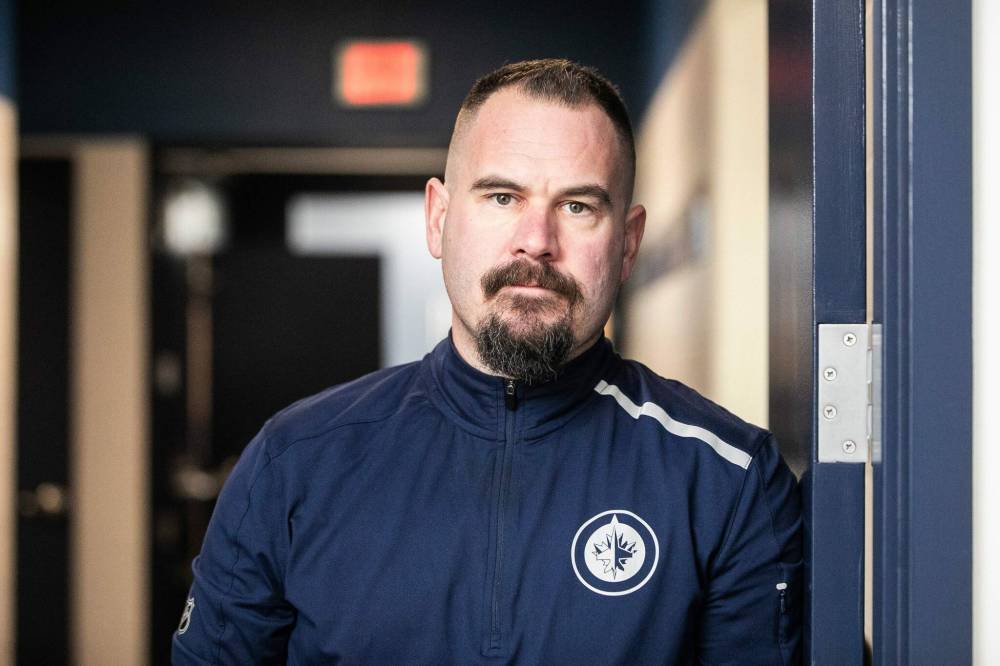
It was evident how fatigued the players looked on the ice at times, including the 4-1 loss in Nashville and even in what will be a 4-1 victory in Minnesota thanks largely to the heroics of goaltender Connor Hellebuyck.
“Body language with them is huge. You can see a guy coming in in the morning and they’re just exhausted. You make sure you’re getting them back ready to play and giving them the best opportunity to succeed,” Pritchard said.
“You see them and you know them and you’ve been around them every day. Some of the guys now 10 years. You can see that.”
Pritchard’s main job is literally hands-on. Lots of massage therapy, working out aches and kinks, and taping guys up. He also oversees all kinds of other physical maintenance, such as riding stationary bikes after morning skates and practices, and before and after games.
He works with the entire medical party that is at every game — head athletic therapist Rob Milette, assistant athletic therapist Brad Shaw, strength and conditioning coach Jake Wolff, assistant strength and conditioning coach Kyle Vouriot.
However, the best medicine is winning, something the Jets have been doing plenty of lately. Pritchard credits the organization for giving players all the tools and resources they need to succeed.
“I always laugh and tell everyone I get to go to work with my seven best friends at all times.”–Jets athletic therapist Al Pritchard
“Mark Chipman does an unbelievable job in this organization. You fly on charter flights, you stay in the best hotels and food is never (overlooked). It’s always the best food everywhere,” Pritchard said.
“Nutrition isn’t something we take lightly around here. Hydration is huge when they’re playing those minutes and things like that.
“That’s probably your biggest hurdle, just making sure you’re checking in with the guys, talking with them and communicating and seeing what they need. Everybody and every body is different.”
Pritchard began working for True North in 2006 with the Manitoba Moose and has been with the Jets since they relocated from Atlanta in 2011. Although the travel can be a grind, the cancer survivor wouldn’t trade it for the world.
“I always laugh and tell everyone I get to go to work with my seven best friends at all times. We do meals all the time together. You’re hanging out with your friends all the time and you’re at your job, so it’s the best of both worlds,” he said.
“Winning makes everything better, but I feel this group, even when we only had that one loss, there wasn’t that arrogance. And it wasn’t even a confidence. It was just even-keel, everyone came to work and they worked hard.
“It’s more of a team than I’ve ever seen. We have 25 guys that all get along and they all bring different personalities and they’re all great people.
“I feel like we’re all working for that end goal together, and no one has that individual mindset on anything.”
MIKE MCINTYRE / FREE PRESS Forward David Gustafsson, who has been a healthy scratch for the bulk of the season, puts in some extra work in L.A.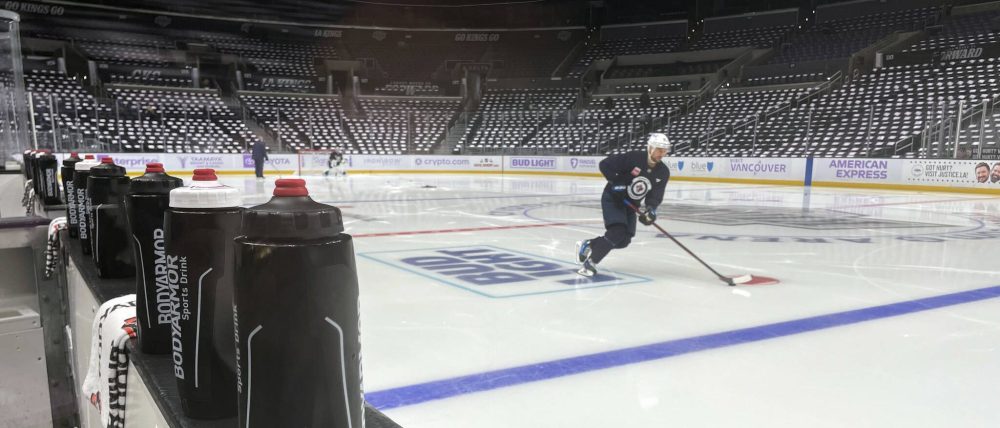
LOS ANGELES — The morning skate officially ended more than 30 minutes ago, with plenty of players already showered, changed and walking back to their nearby hotel located just steps away from the rink.
But assistant coach Marty Johnston is still on the ice, working with perpetual healthy scratches Dylan Coghlan (23-straight games) and David Gustafsson (22 of 23 games), along with backup goaltender Eric Comrie.
“It’s challenging. Everybody wants to play, and it’s really important they’re ready when we need them, and that they also feel valued,” said Johnston.
MIKE MCINTYRE / FREE PRESS Makeshift coach’s room in L.A.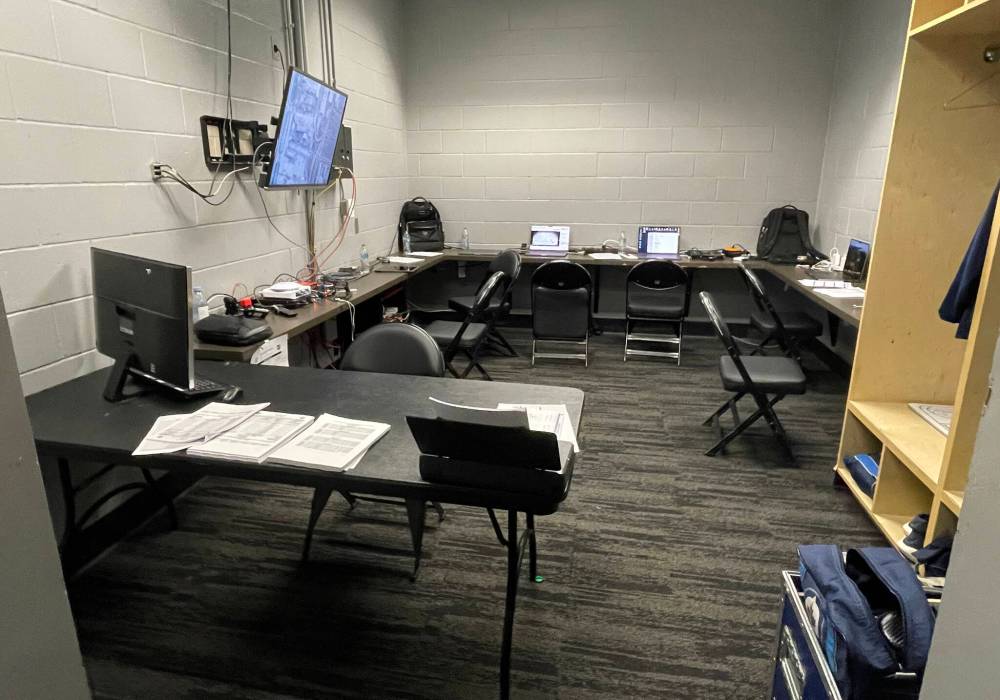
“I think that our group, starting from the leadership group, does a really good job making sure everybody is included.
“Rarely do you find the same group of guys together at the hotel or in the dressing room. It’s a mix of everybody being accepted, everybody being a part of this.”
As Gustafsson is coming off the ice, head coach Scott Arniel passes by: “How’d it go Gus?”
“Not fun,” the young Swede replies.
“Marty in a bad mood?” asks Arniel.
“I think he takes pleasure in it,” said Gustafsson, laughing.
Coghlan will make his season debut two days later in Vegas, while Gustafsson’s number will be called in Dallas after Nikolaj Ehlers can’t suit up because of a lower-body injury.
As much as coaching is about the Xs and Os, managing personalities is a big part of the job. Johnston said being on the road offers valuable opportunities to really dig deep.
MIKE MCINTYRE / FREE PRESS Media backdrop in L.A.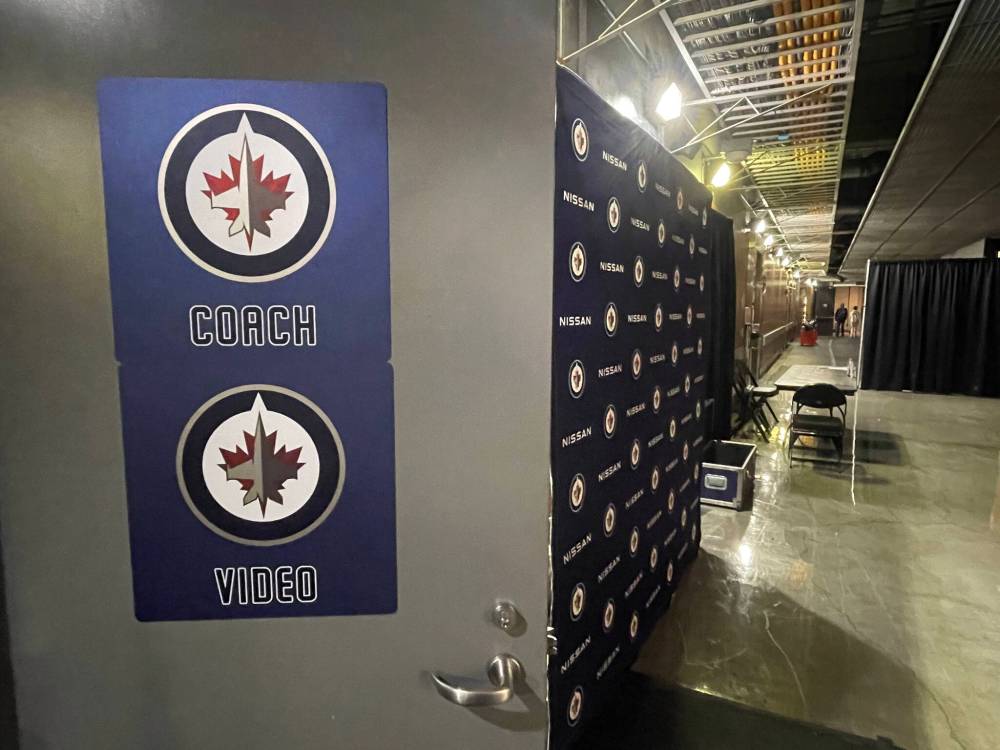
“You have the ability to have meals together, you get to know each other a little bit better than at home. Certainly taking advantage of the opportunities like that creates a strong bond, and it’s one of the positives of being on the road,” he said.
Of course, there can be too much of a good thing, and this particular schedule has been taxing. It’s why the coaches decided to cancel a planned practice the day before in Los Angeles.
“It’s about trying to be as efficient as you can with your workload, with how we’re dealing with the players and at the same time that there’s not monotony setting in,” said Johnston.
“So there’s different days that we do different things so it’s not the same scripted day for the players and the coaches.
“I think Scott’s done a really good job of that so far this year, making sure we have themes for the day, and those themes are different based on what’s happened in the last game or what we’ve done in the last few days.”
Johnston tries whenever possible to get away from the rink and the “noise,” even if just for an hour or two.
An off-day walk down by the water in Los Angeles — on a day when folks back home in Winnipeg were being blasted with cold and snow — was the latest example.
MIKE MCINTYRE / FREE PRESS Crypto.com Arena, home of the Los Angeles Kings. Winnipeg Jets cancelled a planned practice in Los Angeles to give the players and staff some much-needed time away from the rink.
“I feel very fortunate to have the opportunity that I do. Taking in those moments are a lot of the times where your family or your friends ask about,” he said.
“It’s not so much the hockey component but what do those cities look like. You can never forget how fortunate you are.
“I remember going back to Bones (former coach Rick Bowness), he said every day in this league is an absolute privilege. And I certainly take that approach.”
Johnston echoes others in praising Winnipeg’s support staff for being “off the charts in terms of what they do to make sure our players have a great environment to feel comfortable, to feel ready.
“The product on the ice is what everybody sees, but what happens behind the scenes is truly incredible. It’s a lot of hard work, a lot of early mornings, a lot of late nights for those guys.
“They’re the unsung heroes of our group, and they do it for eight, 10 months of the year.”
LAS VEGAS — Chris Kreviazuk is the man with the plan. And as the director of team services sits in the media meal room a few hours before the fifth game of this six-game road trip, there’s no outward sign of stress.
“I don’t worry about too much anymore. If something happens, we’ll just deal with it,” he says.
Any major hand-wringing occurred months ago when the NHL schedule first came out and Kreviazuk sprang into action working the phones and email exchanges with hotel, bus and food partners to make sure everything would be pristine upon their arrival.
He admits to doing a bit of a double take when he saw this particular stretch.
“The first reaction was looking at the three time zones. You look at the map and realize we’re doing a letter Z across the entire country,” said Kreviazuk.
MIKAELA MACKENZIE / FREE PRESS As soon as the NHL releases its schedule, director of team services Chris Kreviazuk begins contacting hotel, bus and food partners in various cities. He admits the scope of the road trip came as a bit of a shock.
“Honestly, it just means you pack a lot more stuff. There’s nothing extra you have to take into account, other than it’s so long. The easiest trip for me is the one going home, because I know everything is done and I can kind of sleep well on the plane.
“Any time you’re going to the next city, you’re on the phone with the hotel, bus drivers, security screeners, so that just gets extended with each trip.”
Kreviazuk can finally see the light at the end of the tunnel, and he’s thankful no weather delays have caused issues for getting a travelling party, comprised of near 50 people combined, from city to city.
He’s quick to credit Air Canada aircraft mechanic Kevin Polonuk, a fellow Winnipegger who accompanies the team on all 41 road games and works closely with him to ensure the charter flights go smoothly.
“I don’t worry about much with him at the helm. He’ll let me know if there’s any issues and we address it,” he said.
Polonuk, now in his sixth full season, is responsible for some maintenance of the aircraft along with helping load equipment and baggage while also co-ordinating manpower and assisting in ensuring customs is cleared in both Canada and the U.S.
“I don’t worry about too much anymore. If something happens, we’ll just deal with it.”–Jets director of team services Chris Kreviazuk
It’s not always the same plane — Air Canada works with 11 NHL teams along with the Toronto Blue Jays, utilizing four specialized aircraft.
“You can imagine the logistics of flying one team to a city and then sending the aircraft to pick up another team has a lot of moving parts,” said Polonuk.
“When it comes to a long road trip like this, we changed aircraft five times to be able to co-ordinate this between Pittsburgh in the east and L.A. in the west as well as four other stops.”
Polonuk said the on-board crew, while not employed by the Jets, deserves credit as well.
“The flight attendants are setting up the special catering to meet the needs of the team. The flight attendants are also dedicated to the team for the full season, which provides them with unmatched service as they quickly learn what the individuals like when they come on board,” Polonuk said.
“The co-ordination of these flights is a challenge for the operation reps and flight attendants, and that does attract those who like the challenge.
“Being born and raised in Winnipeg, I’m a Jets fan from when I was a kid watching the games with my dad. So I feel some pride in travelling with the team.”
MIKAELA MACKENZIE / FREE PRESS For road trips, Kreviazuk works the phones and email to make sure everything is in order when the team arrives in the different cities.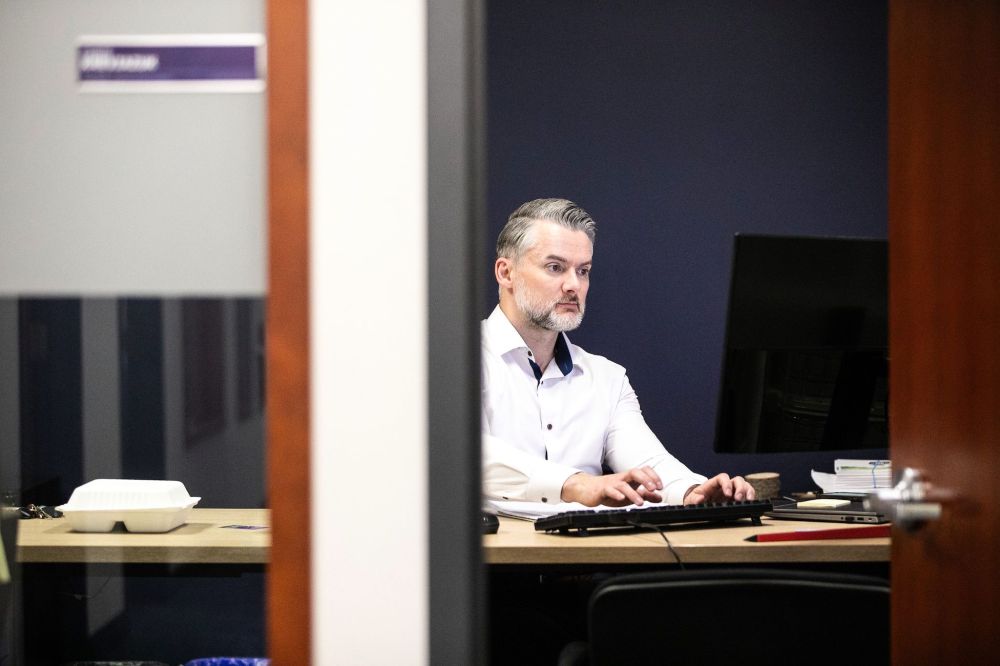
Kreviazuk consults the players in terms of planning certain things, such as big team meals and outings while on the road.
He was originally going to do a U.S. Thanksgiving dinner at the team hotel on Thursday, as they’ve done in previous years when on the road for the holiday.
“I said to the players ‘Look, a town like Vegas, do you really want to be holed up in a hotel from 4-6 p.m., or do you want to be able to do what you want as a team?’ And they said we’ll go and do our own thing,” said Kreviazuk.
“I don’t plan a whole lot for them. You don’t want to monopolize their time any more than we already do, I guess.”
Kreviazuk works with Arniel to coordinate the schedule, including any last-minute changes, and said flexibility is the key.
“Nature of the beast,” he said.
“There’s a huge comfort level with just about every hotel company and every bus company we deal with. Every year out of the 31 cities, I’d say we maybe change three hotels and three bus companies.
“There’s a massive comfort level, whereas if that wasn’t in place and it was a new hotel every time for whatever reason, then I’d be even more grey than I already am now.”
DALLAS — They’ve reached the end of the road. And it’s safe to say this particular trip started better than it ended, with three straight losses to finish up 2-4-0 overall.
“This was an extremely mentally grinding, mentally taxing stretch of games. Not just with the routine, but with the travel,” said director of communications Scott Brown, who has a jack-of-all-trades type role in which he works with support staff, players, coaches, management and both in-house media (radio and TV broadcast crews, social media team) and external media.
“It’s a difficult stretch to try to manage for everybody. Them, physically; the support staff mentally and trying to stay in the sharpest of their games so you can be of assistance to everybody else.”
Taking the pulse of everyone involved is part of Brown’s daily routine. The 82-game season is a marathon, not a sprint, although everybody is feeling a bit winded right now.
MIKAELA MACKENZIE / FREE PRESS Jets director of communications Scott Brown, left, oversees a player scrum at Canada Life Centre on Tuesday.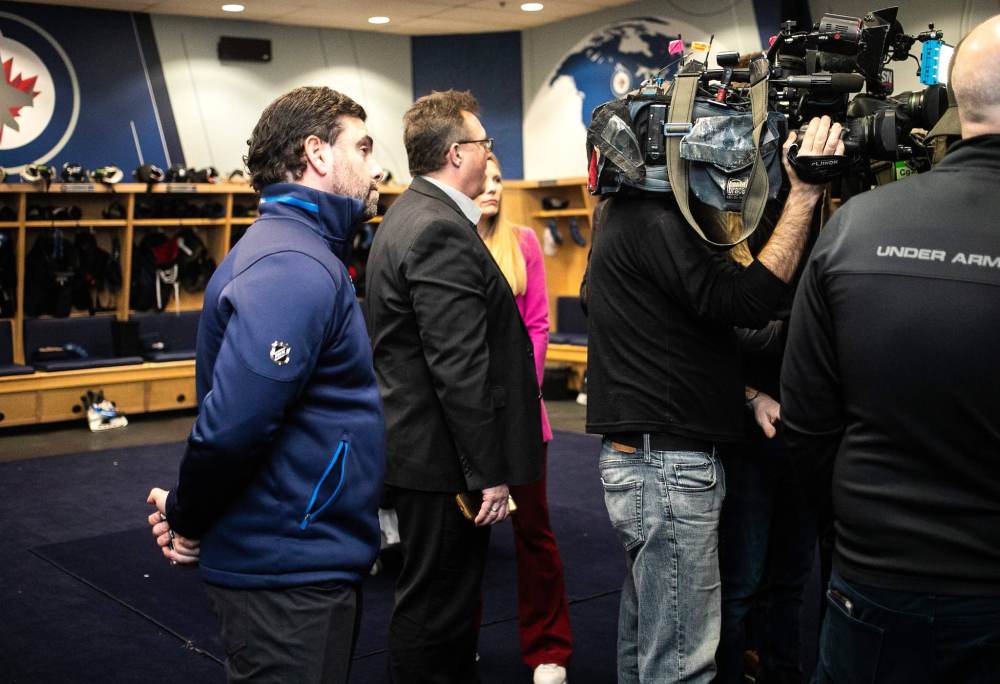
“You have to monitor moods, you have to monitor momentum. And you have to manage what the message is. You’ve got to make sure, particularly in a grinding road trip like this, that everybody stays in the right frame of mind,” said Brown.
“You try to alleviate that, whether it’s being a sounding board for the players, whether it’s being a sounding board for the media, acting as a go-between. You try to alleviate a lot of the stress and a lot of the grind that there is. That can be a little taxing.”
Yes, players are richly compensated to play a game for a living, and in that sense nobody should feel sorry for them.
“But there’s not too many jobs that have this amount of travel, and then ask for peak physical performance in the middle of all that travel,” said Brown.
“I agree they’re paid a lot of money, but the money doesn’t help you sleep when you get in to the next city at two in the morning. It’s great, but it doesn’t provide that burst of energy.”
“We have to emphasize doing those things well, so the players enjoy their time in the city and around each other.”–Jets director of communications Scott Brown
Brown speaks with his colleagues around the league, along with plenty of former Jets players who have moved on to other markets.
He states with confidence that Winnipeg goes above and beyond to roll out the red carpet in terms of the day-to-day life they provide.
“I don’t think I’m really telling stories out of school that Winnipeg isn’t New York, and Winnipeg isn’t Florida. So as an organization we have to do a lot of the smaller details that the players probably don’t realize, until they’re experiencing them, or they’re not experiencing them in other locations,” he said.
“We have to emphasize doing those things well, so the players enjoy their time in the city and around each other. The more that we can do to make sure they enjoy each other and are having fun as a group with all of us, that’s the type of thing we have to do.
“The buses and the flights have to go smoothly, the food has to be top-notch and has to be on time. The hotels have to be smooth along with our arrivals.”
MIKE MCINTYRE / FREE PRESS Connor Hellebuyck and goalie coach Wade Flaherty share a laugh during practice.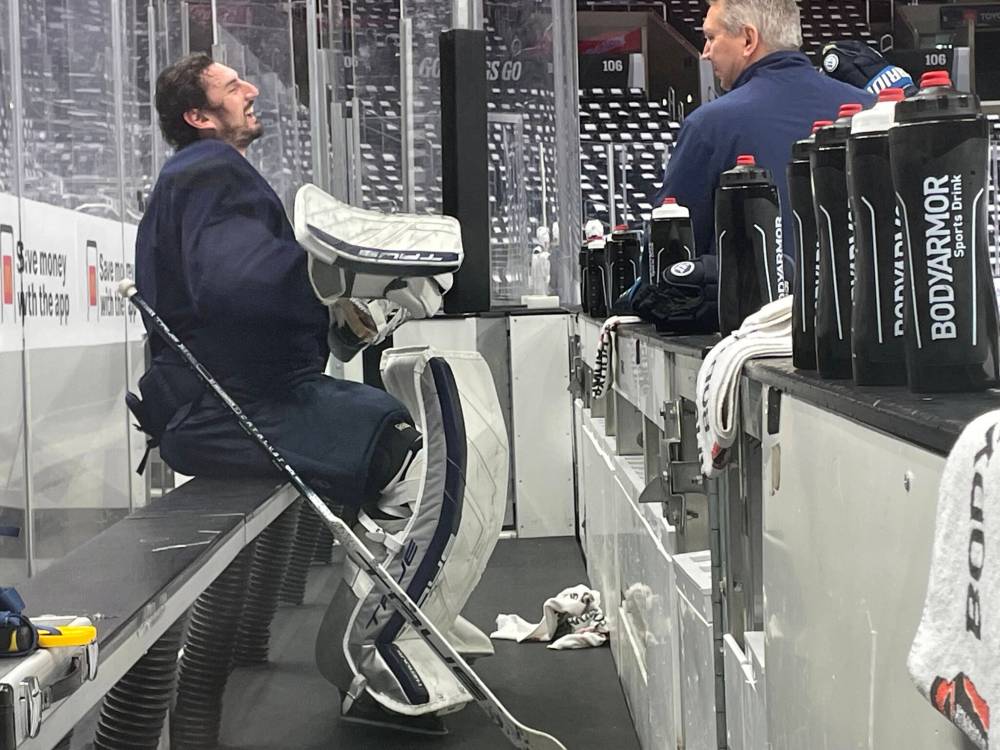
As he’s speaking with the Free Press outside the team’s locker room, Brown has his laptop open as he keeps an eye on his daughter’s hockey game going on at the same time back in Winnipeg and being streamed on the LiveBarn feed.
The work-life balance can be tough when you’re away from home for so long.
“You’re not going to catch me complaining. But it’s a long way away and a long time away from family, and it’s hard on everybody, including the families,” said Brown.
Being surrounded by good people — not to mention a team off to a great start despite some recent stumbles — certainly helps the cause.
“The thing I realized and witnessed this year, which has been enjoyable, is they’re all having fun with each other. It’s not a cliquey type group. Everybody sits with everybody in the meal room, it’s not the same type of guys sitting at one table and the same type at another,” said Brown.
“If there’s seats available, everybody fills up that table before they drift over to another table. I think the group itself has been a real tight-knit group. The leadership has made it a point to make sure everybody is included.”
“The thing I realized and witnessed this year, which has been enjoyable, is they’re all having fun with each other. It’s not a cliquey type group.”–Scott Brown
Indeed, at every stop along the way we observed different players grouped together, whether it was strolling down the Vegas Strip or heading out for a bite to eat after practice in Dallas.
“It’s a little nicer when you have a couple days in a city and can kind of go do an excursion together or whatever, have a fun dinner,” said Scheifele.
“This one’s a little different, having a back-to-back to start it and pretty much travelling all across the world. You’ve got to find when’s the time to get together as a team and when’s the time to be a pro and get your rest and relax. It’s just one of those happy-medium things.
“I think just being together on the plane, in the room, at the hotel, wherever it is, it’s always valuable to have extra time with the guys.”
As the old saying goes, teamwork makes the dream work.
“They make our life as easy as possible. The food’s there, equipment is always ready to go,” alternate captain Josh Morrissey said of the behind-the-scenes team.
“In the NHL we’re pretty spoiled, and the guys we have here do a great job.”
mike.mcintyre@freepress.mb.ca X and Bluesky: @mikemcintyrewpg

Mike McIntyre is a sports reporter whose primary role is covering the Winnipeg Jets. After graduating from the Creative Communications program at Red River College in 1995, he spent two years gaining experience at the Winnipeg Sun before joining the Free Press in 1997, where he served on the crime and justice beat until 2016. Read more about Mike.
Every piece of reporting Mike produces is reviewed by an editing team before it is posted online or published in print — part of the Free Press‘s tradition, since 1872, of producing reliable independent journalism. Read more about Free Press’s history and mandate, and learn how our newsroom operates.
Our newsroom depends on a growing audience of readers to power our journalism. If you are not a paid reader, please consider becoming a subscriber.
Our newsroom depends on its audience of readers to power our journalism. Thank you for your support.





